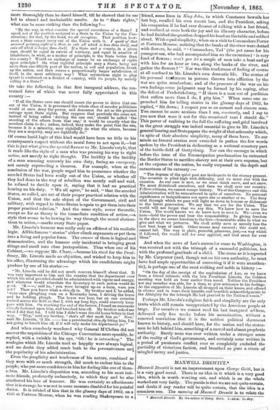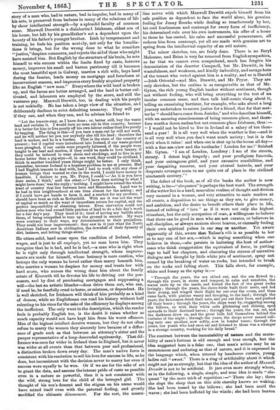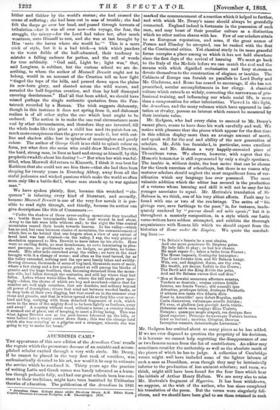MAXWELL DREWITT.*
Maxwell Drewitt is not an improvement upon George Geith, but it is a very good novel. There is an idea in it which is a very good idea, which is worth working out, and which is on the whole worked out very fairly. The puzzle is that wo are not quite certain, and doubt if auy reader will be quite certain, that the idea is a conscious one. The meaning of Maxwell Drewitt is to relate the * Maxwell Dreeritt. By the author of Georg! (kith. JAndou: Tii Bley.
story of a man who, bad in nature, bad in impulse, bad in many of his acts, is preserved from badness in many of the relations of life by sheer intellectual strength—by a splendid faculty of common sense. Maxwell Drewitt is a disinherited Irishman, eldest son of his house, but left by his grandfather's act a dependent upon the bounty of his father's younger brother. Irish by temperament and training, he feels his position acutely, not only for the humilia- tions it brings, but for the wrong done to what he considers " justice," despises commerce, and rejects the aid of those who might have assisted him. But English by the structure of his brain, he seta himself to win success within the limits fixed by caste, borrows money, improves his small and barren patrimony till it becomes the most beautiful spot in Galway, marries a rich wife, buys land during the famine, lends money on mortgage and forecloses at inconvenient seasons, and improves every freshly acquired property like an English " new man." Everywhere the wild land is broken up, and the farms are better arranged, and the land is better cul- tivated, and labourers are employed by the score, and still the ventures pay. Maxwell Drewitt, too, in dealing with his people is not unkindly. He has taken a large view of the situation, and deliberately declines to evict defaulting tenantry. They will pay if they can, and when they can, and he advises his friend to
"Let the tenants stay, as I have done ; or, better still, buy the waste land and reclaim it. I would turn no man out in this country, because it is better for him to live poorly off his own labour rather than live poorly by begging. The thing is this—if you turn a man out he will not work, and he will neither let you nor anybody else till his land ; therefore the land is useless, and he is a burden. That is the state of the country at present ; but if capital were introduced into Ireland, if our waste ground were ploughed, if our cattle were properly fattened, if the people were taught to eat beef and mutton, if they could be made to love luxury, if they could be induced to wear shoes and stockings, and to live in any house better than a pig-stye—if, in one word, they could be civilized, I think in another hundred years things might be better. I only think, remember, because Ireland is a hopeless problem to me at present. Had I had English tenants to deal with, had I had to work with any class of human beings that wanted to rise in the world, I could have money in handfuls. I declare to you, Mr. Pryor, I could.'—' As it is you have done amiss, I think,' said the other.—' I have done nothing to what I might have done,' was the reply; nothing. I might have owned the whole tract of country that lies between here and Bennebeola. Land was to be had in this neighbourhood at one time almost for the asking ; and if I could have got hands to farm it, and a market for my produce, I should have been as rich as Rothschild. With me it was not the want of capital so much as the want of immediate return for capital, and the perfect impossibility of obtaining labour. Even starvation could not induce men who had owned little patches of land to do a fair day's work for a fair day's pay. They tired of it; tired of having my bailiffs after them, of being compelled to tarn up the ground in earnest. My ways were contrary to their ways, my determination to their prejudices. They could not bear improvement: they saw in it just what the North American Indians saw in civilization, the downfall of their dynasty of dirt, laziness, and letting things alone.' "
He utters solid, hard sense upon the condition of Ireland, raises wages, and is just to all employis, yet no man loves him. They recognize that he is bad, and he is bad,—a man who is right when he is right only through intellectual strength, whose improve- ments are made for himself, whose leniency is mere caution, who betrays the only woman he loved rather than marry beneath him, who marries a woman he despises for money and treats her with hard scorn, who nurses the wrong done him about the family estate of Kiucorth till he devotes his life to driving out the pos- sessors, and by dint of purchasing mortgages and suppressing a will—the last an artistic blunder—does drive them out, who can, if need be, be fearfully cruel to horse, or mistress, or dependent. He is well sketched, for Irishmen will think of him probably as a kind of demon; while no Englishman can read his history without half relenting to his vices for the sake of the efficiency he displays among the inefficient. The only want in the description, which the reader feels is probably English too, is the doubt it raises whether so much capacity would not have kept him from his worst offences. Men of the highest intellect deceive women, but they do not often refuse to marry the women they sincerely love because of a differ- ence of grade such as that between an attorney's sister and the pauper representative of a long-descended squirearchy. That dif- ference was once far wider in Ireland than in England, but it never was wider at all events than that between peer and professional, a distinction broken down every day. The man's native force is consistent with his resolution to sell his love for success in life, as he does, but inconsistent with the decision never to marry her even if success were equally to be won. Or if we are for the sake of art to grant the data, and assume the intense pride of caste as possible even in a nature so powerful, then it is not consistent with the wild, strong love for the child of the betrayed girl. The thought of his son's descent and the stigma on his name would have mixed itself even with the paternal feeling, and greatly modified the ultimate denouement. For the rest, the mascu- line nerve with which Maxwell Drewitt expels himself from his safe position as dependent to face the world alone, his genuine feeling for Jenny Bourke while dealing so treacherously by her, his cool fearlessness and contempt for every form of inefficiency,. his determined rule over his own instruments, his offer of a home to those he has ousted, his calm and successful perseverance, all redeem him from contempt, yet all are made with genuine art to spring from the intellectual capacity of an evil nature.
The minor sketches, too, are fairly done. There is no Beryl Molozane, and Brian is very far removed from English sympathies, so far that we cannot even comprehend, much less forgive his denunciation of the deserter Campnell, but Mr. Drewitt, in hie. wastefulness, and weakness, and kindly imbecility, and savage hate of the tenant who voted against him is a reality, and so is Harold —Irish Oriental—and Mrs. Drewitt, and Mr. Pryor. They are only sketches, but the outline is as recognizable as that of Mr. Gyton, the rich young English banker without sentiment, though, not without feeling, who will bring everything to the teat of an insular common sense, and then talk half-comic slang about it, telling an examining barrister, for example, who asks about a long journey undertaken to secure justice for a friend, that for that mat- ter he " should have come from Jericho," and who describes himself,. with an amusing consciousness of being common-place, and there- fore worth a dozen useless but not common-place Irishmen, thus :- " I would not be hired to live in Ireland at a salary of ten thou-. sand a year ! It is all very well when the weather is fine—and it is all very well when you don't want much society ; but it is the devil when it rains and when one is shut up in the house all day— with a fine sea-view and the toothache London for me I' finished Mr. Gyton. I am of London, Londony ; I am of the streets, streety. I detest high tragedy ; and your prodigious funerals, and your outrageous grief, and your excessive sensibilities, and your despairing remorse, and your eternal hatreds, and your desperate revenges seem to me quite out of place in the civilized nineteenth century.' " The defect of the book, as of all the books the author is now writing, is its —" eloquence" is perhaps the best word. The strengtlt of the writer lies in a hard, masculine realism of thought and diction very unusual in a woman, and very attractive to male readers at all events, a disposition to see things as they are, to give money, and ambition, and the desire to benefit others their place in life, instead of talking of " love " as if it were not only the highest stimulant, but the only occupation of man, A willingness to believe that there can be good in men who are not curates, or believers in self-discipline, or always anxious about heaven, or eternally feeling their own spiritual pulses in one way ur another. Yet aware apparently of this, aware that Balzac's role is as possible to her as to any one of her sex,—which is saying something when one believes in them,—she persists in imitating the host of author- esses who think exaggeration the equivalent of force, in putting tags to half her chapters, and obscuring the stream of narrative dialogue and thought by little white jets of sentiment, spray not caused by the breaking of water on rocks, but intended to break on the rocks and falling short. This falls short, for example, white and foamy as the spray is:— "Through the years, the sea ebbed out, and the sea flowed in through the years, in storm and tempest, in calm and sunshine, the waves stole up on the sands, and kissed the feet of the great rocks lovingly ; through the years, the shore-birds built their nests, and fed their young, and winged their flight far out over the ocean, and then came back, with pinions weary and drooping, to the land ; through the years, the fishermen dried their nets, and put out their lines, and pushed off their boats ; through the years, the ships went by, staggering among the billows, or with their white sails glistening and shining, sped onwards to their destined haven ; through the years, the sun set, and the darkness drew on, and the great hills hid themselves behind the curtains of the night ; through the years, the deeps never ceased call- ing unto one another, now softly, now in louder tones ; through the years, the youth who had once sat and listened to them was a stranger in a strange country, working for his daily bread."
The contrast between the immutability of nature and the muta- bility of man's fortune is told enough and true enough, but the idea suggested here is a false one, that man's action may be as monotonous and enduring as that of nature, and it is expressed in the language which, when uttered by handsome curates, young ladies call "sweet." There is a ring of artificiality about it which might not jar so strongly, but that the idea of the author of Maxwell Drewitt is not to be artificial. It jars even more strongly where, as in the following, a single, simple, and true idea is made " elo- quent" by the mere trick of repetition :—" There she lay ; there she slept the sleep that on this side eternity knows no waking. She had been tossed by the billows ; she had been amid the waves ; she had been buffeted by the winds ; she had been beaten hither and thither by the world's storms ; she had crossed the ocean of suffering ; she had been out in seas of trouble; she had felt the deeps go over her head, and passed through torrents of tribulation —but it was all over now—the voyage, the fear, the struggle, the misery—for the Lord had taken her, after much weariness, unto Himself to rest, and she was at last brought by Him unto the haven where she would be." This is a mere trick of style, but it is a bad trick—a trick which panders to the worst foible of the half-educated, their tendency to mistake a falling cadence for pathos, and the roll of words for true sublimity. " God said, Light be ; light was," that, said Longinus, is sublime, but the curious school we are de- scribing, to whom the author of Maxwell Drewitt ought not to belong, would in an account of the Creation tell us how light "tinged the tops of the bills, and poured down upon the plains its new-born glory, and slanted across the wild waters, and revealed the half-begotten creation, and then lay half dismayed covering desolateness.° Miran that been added, we should have missed perhaps the single authentic quotation from the Pen- tateuch recorded by a Roman. The trick suggests dishonesty, though in this instance it does not spring from it, and dishonest realism is of all other styles the one which least ought to be endured. The notion is to make the one real circumstance more real by other circumstances, and therefore they are invented, till the whole looks like the print a child has used its paint-box on, much more conspicuous than the graver ever made it, but with out- line and shadow alike lost in splashes of meaningless and gaudy colour. The author of George Geith is no child to splash colour on form, yet what does she mean who could draw Maxwell Drewitt, the hard, strong man, in lines as hard and strong as himself, by this prophetic twaddle about his destiny?—" But when her wish was ful- filled, when Maxwell did return to Kincorth, I think it was best for Kathleen that she could not see him there—that she had then been sleeping for twenty years in Eversbeg Abbey, away from all the sinful jealousies and wicked passions which make the world so often seem only like a battle-fief, where man stands up to war against man."
We have spoken plainly, first, because this wretched " elo- quence" is infecting every kind of literature, and secondly, because Maxwell Drewitt is one of the very few novels it is pos- sible to read right through, and thirdly, because its author can give descriptions like this of Connemara :—
"Under the shadow of those never-ending mountains they travelled on ; beside those interminable lakes the road wound in and about. Away to the left were hills without end; to the right the blue conical mountains roared their heads towards heaven. In the valley—which has no end, but runs between chains of mountains, the commencement of which lies so far behind that one forgets when a view of any extent of level land was last obtained—in the valley, I say, the very genius of desolation appeared to Mrs. Drewitt to have taken up his abode. Here were no smiling fields, no neat farmhouses, no cows luxuriating in plea- sant pastures, no gentlemen's seats, no hedges, no gardens, no home- steads. Mile after mile stretched away the valley ; no turn in the road brought with it a change of scene ; and often as the road turned, far as the valley extended, nothing met the eye save lonely lakes and swiftly- flowing streams, thousands of acres of bog land, thousands more of moor, where a few sheep and a few ponies grazed at will among the blocks of granite and the huge boulders, that, becoming detached from the moun- tain side, had fallen through the centuries, and still lay where they had fallen. Lakes where water-lilies float, where the tall reeds grow spar- ingly—lakes, the shores of which are bog and moorland—lakes that for number are well nigh countless, that are desolate, and solitary beyond all power of description ; rivers that wind not between wooded banks, or in deep beds of their own digging, but that crawl on in the summer over stone and granite, and that in winter spread wide as thq like over moor- land and bog, carrying with them detached fragments of rock, which seem in the arms of the mighty flood to be born lightly as feathers, away and away! A country without wood, without a house ; a country where ft seemed out of place, out of keeping, to meet a living being. This was what Agnes Drewitt saw as the post-horses laboured up the hills, or were lashed into a weary canter down them ; this was the strange land which she was entering as a pilgrim and a stranger, wherein she was going to try to make her home."
































 Previous page
Previous page